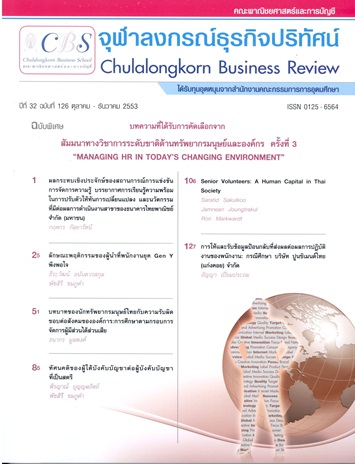ลักษณะพฤติกรรมของผู้นำที่พนักงานยุค Gen Y พึงพอใจ
Main Article Content
Abstract
บทคัดย่อ
ในปัจจุบัน พนักงาน Generation Y (ผู้ที่เกิดในปี พ.ศ.2520-2543) เป็นกลุ่มแรงงานที่เข้าสู่ตลาดแรงงานจำนวนมาก ในฐานะพนักงานใหม่ และ ผู้บริหารระดับต้น Generation Y เป็นผู้ที่มีเจตคติต่องานและรูปแบบการใช้ชีวิต แตกต่างจาก พนักงานในรุ่นก่อนหน้าซึ่งอาจส่งผลต่อมุมมองในลักษณะของพฤติกรรมผู้นำที่ร่วมงานด้วย ดังนั้นการศึกษานี้มีวัตถุประสงค์ ที่จะศึกษา รูปแบบผู้นำ และลักษณะของพฤติกรรมของผู้นำ ที่พนักงานในยุค Generation Y พึงพอใจที่จะร่วมงานด้วย ตลอดจน ศึกษาผลของปัจจัยส่วนบุคคลของ Generation Y ต่อลักษณะของผู้นำที่ Generation Y พึงพอใจจะร่วมงานด้วย โดยทำการศึกษาข้อมูลจากกลุ่มตัวอย่าง Generation Y ในประเทศไทยจำนวน 415 ราย จากการศึกษาพบว่า Generation Y พึงพอใจรูปแบบผู้นำแบบมอบหมายอำนาจ และ พฤติกรรมการนำ ที่ให้ความชัดเจนแก่พนักงานในเรื่องความรับผิดชอบ และอนุญาตให้ตัดสินใจว่าจะทำงานให้สำเร็จได้อย่างไร เป็นพฤติกรรมที่กลุ่มตัวอย่างพึงพอใจมากที่สุด รองลงมาคือ รูปแบบผู้นำแบบผู้ฝึกสอน และ ผู้นำแบบส่งเสริมสนับสนุนตามลำดับ ส่วนรูปแบบผู้นำแบบสั่งการบังคับบัญชา เป็นรูปแบบที่ Generation Y พึงพอใจน้อยที่สุดในรูปแบบผู้นำทั้ง 4 รูปแบบ นอกจากนี้ยังพบว่า ปัจจัยส่วนบุคคลบางประการ เช่น อายุ รายได้ ตำแหน่งงาน ของ Generation Y มีผลทำให้เกิดความแตกต่างในความพึงพอใจในผู้นำรูปแบบต่างๆ
Abstract
Currently, Generation Y (the ones who were born in 1977-2000) are marching in to the workplace as the new workforces. Generation Y’s attitude toward works and their lifestyles differ from those of the prior generations in the workplace and may effect to opinions about their leader’s behavior. Therefore, this study aims to study style of leadership and leader’s behaviors desired by Generation Y and also study the effect of Generation Y’s personal factors on desired leadership style by using questionnaires to collect data from 415 Generation Y in Thailand. Result of the study reveals that the delegating style is the most desired and the behavior that provide staff with clear responsibilities and allow them to decide how to accomplish them is the most desired leader behavior. The other desired leadership styles are coaching, facilitating and directing style respectively. In addition, some personal factors such as age, income and position ranking effect desired styles.
Article Details
Opinions and discussions in papers published by the Creative Business and Sustainability Journal (CBSJ) are deemed as personal opinions and the responsibility of the writers. They are not the opinions or responsibility of the Chulalongkorn Business School of Chulalongkorn University.
Papers, content, information etc. appearing in the Journal are deemed to be the copyright property of the Chulalongkorn Business School of Chulalongkorn University. Anybody or any organization that wishes to publish any part of them or use them in any way must obtain written permission from the Chulalongkorn Business School, Chulalongkorn University.


